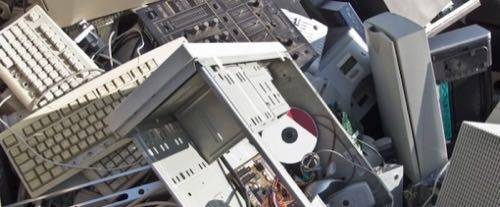
Apple devices have become increasingly difficult to take apart for service and recycling. The company has removed 39 of its products from a global registry of environmentally friendly devices. The move may prevent the company’s hardware from being purchased by a wide variety of customers – including the U.S. federal government.
Criticism for Apple’s recyclability came to a head recently when the hardware site iFixit noted that the new MacBook Pro with Retina display used a copious amount of glue to bind the display, case and boards within the device together. As iFixit discovered, this makes the device very hard to service and recycle – and ineligible for the Electronic Product Environmental Assessment Tool (EPEAT) registry, which rates devices on their greenness based on factors such as longevity and recyclability.
And things heated up last week when Apple voluntarily pulled its products from the EPEAT list.

It’s not that Apple hates the environment. The company pays attention to green matters and does have its own recycling program: When consumers return an OS X device, Apple gives them any remaining monetary value as an Apple Gift Card. For example, iOS devices that are walked in to an Apple Store will earn their owners a 10% discount on a new one.
So why the walk back from the Green Mile? It could be that as Apple tries to pack more and more features into each device, they just naturally get harder to take apart.
Apple’s Business Decision
Or it may be about another kind of green: the kind on dollar bills. By preventing Apple devices from being easily disassembled for repair, the company encourages more participation in its AppleCare support program, which includes global repair coverage, and AppleCare+, which includes repair and replacement coverage.
Either way, it gets more people coming in to Apple’s support program, through its retail stores or authorized repair partners, rather than self-repairs – which generate less or even no additional revenue for the company.
Of course, Apple could simply be hoping that buyers will forgo the repair process entirely and acquire a new device instead.
In all these cases, the recycling issues are just an unfortunate side effect.
Officially, Apple is maintaining a stance that despite the removal of its devices from the EPEAT registry, these products are still environmentally friendly.
“Apple takes a comprehensive approach to measuring our environmental impact and all of our products meet the strictest energy efficiency standards backed by the U.S. government, Energy Star 5.2,” Apple representative Kristin Huguet told The Loop. “We also lead the industry by reporting each product’s greenhouse gas emissions on our website, and Apple products are superior in other important environmental areas not measured by EPEAT, such as removal of toxic materials.”

San Francisco Leads the Opposition
Despite such assurances, some customers are already rebelling. The City of San Francisco, for example, is blocking new purchases of Macs. Because of the city’s procurement policies, San Francisco’s Department of Environment is sending “out letters over the next two weeks, informing all 50 of the city’s agencies that Apple laptops and desktops ‘will no longer qualify’ for purchase with city funds,” according to CIO Journal.
We’re not talking about a lot of computers. The CIO Journal report indicated that only 500 to 700 of San Francisco’s computers are Macs, representing just 1% to 2% of the city’s total boxes.
Still, Apple’s decision to leave the EPEAT list will have similar ramifications with other customers, because municipalities, schools and even a growing number of corporations have adopted environmentally friendly policies that prevent them from purchasing non-EPEAT devices. U.S. federal agencies, for example, are required to give EPEAT-registered products preference in procurement decisions, which could block Apple sales in that sector.
A Good Deal for Apple?
Apparently, Apple figures that repair revenue and repeat customers will generate more revenue than any sales it might lose from not being on the EPEAT registry. Savings from not having to meet EPEAT’s standards may add to this equation.
After all, most consumers (the company’s core market) aren’t really aware of EPEAT. And many companies that do care about EPEAT don’t have formal handheld device procurement policies, relying instead on looser bring-your-own-device (BYOD) policies.
It’s not clear where concern for the environment actually fits into the calculations.
San Francisco image courtesy of Shutterstock.

















